The Best of Harry Turtledove, by Harry Turtledove (Subterranean)
This is a huge book, a rich feast of imagination and
consummate story-telling. The stories feature a wide range of characters and
situations, including the nine-foot-tall Sasquatch who serves as governor of
the fictional state of Jefferson; the descendants of dinosaurs that never got
wiped out by the asteroid, digging up their own ancestors’ bones in a Wild West
Dinosaur Craze and re-visiting Moby Dick as a mosasaur; heart-breaking
tales of Jewish survival of the Holocaust; a fictional confrontation between
Galileo and a leader of the Holy Inquisition; Cthulhu as a university lecturer
in genetics; and a thriller set in 1940s New Orleans in which defeated
Southerners plot to distract the Loyal States from entering World War II. It’s an
understatement to say there is something here for every taste, but the scope
and effortlessness of Turtledove’s storytelling never falls short.
The Dispatcher: Murder by Other Means, by John Scalzi
(Subterranean)
Part noir detective story, part thriller, part inventive science fiction that examines a world in which death is not permanent (well, certain kinds of death and mostly), this is newest adventure in John Scalzi’s “The Dispatcher” series. I hadn’t read the first one but quickly found that didn’t matter. Scalzi skillfully weaves in all the necessary backstory with nary a plot hiccough.
In Scalzi’s world, a few years ago almost all folks who were
murdered don’t die, they reappear in a place they feel safe, like a childhood
home. Natural deaths are something else: you die, you stay dead. A new
profession has arisen, that of “dispatcher,” a not-murderer for hire. If you’re
about to die naturally, you hire them and get another chance at life. Most of
the time. But business has been drying up, and Tony Valdez has been taking on
cases that blur the shady line of what’s strictly legal. Like killing a Chinese
executive so he can re-appear thousands of miles away in time for an important
business meeting. At this point, Scalzi propels Valdez firmly into thriller
territory, with plenty of dramatic tension, noir mystery, and danger. In Scalzi’s
superlatively competent hands, it all comes together seamlessly for a can’t-put-it-down
ride.







